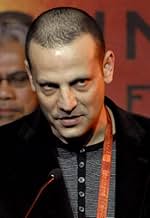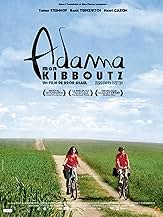Aggiungi una trama nella tua linguaSet in mid-70's, 12-year old Dvir Avni navigates between the equality values of his home-born Kibbutz and the relationship with his undermined mother, whom the Kibbutz members will to denoun... Leggi tuttoSet in mid-70's, 12-year old Dvir Avni navigates between the equality values of his home-born Kibbutz and the relationship with his undermined mother, whom the Kibbutz members will to denounce.Set in mid-70's, 12-year old Dvir Avni navigates between the equality values of his home-born Kibbutz and the relationship with his undermined mother, whom the Kibbutz members will to denounce.
- Regia
- Sceneggiatura
- Star
- Premi
- 9 vittorie e 7 candidature totali
Recensioni in evidenza
In the center of "Sweet Mud" ("Adama Meshuga'at" in Hebrew) we find the story of Miri Avni (Ronit Yudkevitz) and her growing up son, Dvir (Tomer Steinhof, with a stunning debut), in a southern Kibbutz during the 1970's.
Where people have to struggle to give from themselves for each other, Miri is constantly trying to recover from the mysterious death of her husband. Under these circumstances, Miri's sensitive situation is worsened and stands contrary to the values of equality that rule the Kibbutz, through the eyes of its members.
Dvir, who's at his Bar-Mitzva's year, is familiar with his mom's condition and tries to prevent her from losing her mind and kick her back to float with the stream. This purpose becomes even more complicated when Dvir has to deal the contrast between the Kibbutz's equality values and his mother's liberty and freedom to live as mentally-ill person at the normative society, and is about to change his adolescence and life.
This flick was mastered and crafted by an accurate and sensitive direction, powerful performances, trembling soundtrack and phenomenal cinematography, and it's well driven by its refined storyline.
Dror Shaul portrayed a personal, yet very resolute story of life in the Kibbutz before privatization, alongside a strict, emotionally-precise coming-of-age tale for independence and dignity.
Young actor Tomer Steinhof is the basis of this film. His performance is so minimalistic, so moving and so convincing that he just tears apart the viewers hearts. This kid HAS to win world-wide recognition and must appear on as many films as possible. Beautiful Ronit Yudkevitz is another supporting-pillar of the film, with a wretched, merciless portrait of a lapsed and helpless woman. Her physical and mental deterioration is absolutely heart-rending. The chemistry between these two marvelous actors and the characters they hand over to the screen is very convincing and leads to many emotional refractions.
The supporting actors do wonderful job as well; Senior Belgique actor Henri Garcin shines on a 5-minutes, yet very important role, as the foreign aging lover of Miri; Shai Avivi with a role of the "comic-moderator" though a very malice person; Gal Zaid as the controversial secretary of the Kibbutz; And many more.
Mixed with mesmerizing music and amazing cinematography, this movie turns to be one of the best Israeli films of all times, if not the best of them.
I was truly affected by this piece of culture.
Where people have to struggle to give from themselves for each other, Miri is constantly trying to recover from the mysterious death of her husband. Under these circumstances, Miri's sensitive situation is worsened and stands contrary to the values of equality that rule the Kibbutz, through the eyes of its members.
Dvir, who's at his Bar-Mitzva's year, is familiar with his mom's condition and tries to prevent her from losing her mind and kick her back to float with the stream. This purpose becomes even more complicated when Dvir has to deal the contrast between the Kibbutz's equality values and his mother's liberty and freedom to live as mentally-ill person at the normative society, and is about to change his adolescence and life.
This flick was mastered and crafted by an accurate and sensitive direction, powerful performances, trembling soundtrack and phenomenal cinematography, and it's well driven by its refined storyline.
Dror Shaul portrayed a personal, yet very resolute story of life in the Kibbutz before privatization, alongside a strict, emotionally-precise coming-of-age tale for independence and dignity.
Young actor Tomer Steinhof is the basis of this film. His performance is so minimalistic, so moving and so convincing that he just tears apart the viewers hearts. This kid HAS to win world-wide recognition and must appear on as many films as possible. Beautiful Ronit Yudkevitz is another supporting-pillar of the film, with a wretched, merciless portrait of a lapsed and helpless woman. Her physical and mental deterioration is absolutely heart-rending. The chemistry between these two marvelous actors and the characters they hand over to the screen is very convincing and leads to many emotional refractions.
The supporting actors do wonderful job as well; Senior Belgique actor Henri Garcin shines on a 5-minutes, yet very important role, as the foreign aging lover of Miri; Shai Avivi with a role of the "comic-moderator" though a very malice person; Gal Zaid as the controversial secretary of the Kibbutz; And many more.
Mixed with mesmerizing music and amazing cinematography, this movie turns to be one of the best Israeli films of all times, if not the best of them.
I was truly affected by this piece of culture.
10tonyw-21
This is the second feature film by Dror Shaul. Set on an Israeli kibbutz Bet-Gvurot in 1974, this provocative film explores life on the kibbutzim in its most hilarious and dark forms. Dvir (Tom Steinhof) is an adventurous 12-year old who protects his mother Miri (Roni Yudkevitch), a single parent who is emotionally unstable. Miri forms a long-distance romance with an older man in Switzerland Stephan (Henri Garcin). When Stephan comes to visit, Miri emerges from her darkness and for an instant, her life shines. When Stephan's actions bring him into conflict with the leadership of the kibbutz, he is banished and Miri regresses. Dvir's brother Eyal (Pini Tabger) goes off to fight in the Yom Kippur War and Dvir is on his own and restless as he approaches his Bar Mitzvah. The film paints an unflattering image of life on the kibbutz, raising issues such as alcoholism, promiscuity, and acute isolation. When Shaul offered an advance screening at a kibbutz in Israel, they were reportedly shocked and offended. A poignant and funny film with a bitter-sweet ending.
I saw Sweet Mud at the Philadelphia Film Festival last night. My friend and I were expecting something slow-moving and maybe boring at times, but we were pleasantly surprised. The movie sold out (word must have gotten around) and you could tell by the audience's reactions that everyone loved it. This film gives such a detailed view of life on a commune, and at the same time it showed a young boy's struggle with his depressed single mother with plenty of comedic moments. I'm not much of a reviewer but I highly recommend seeing this film... it's playing again in Philadelphia this Tuesday at the Ritz Five, for those of you who live in the area!
8Nozz
I saw this one on Netflix, and if everything mentioned in the other reviews is in the movie, then the Netflix version cuts at least one episode a bit short. Elsewhere in the movie I noticed what seemed to be an unexplained jump slightly forward in time. But there was a complete story, and it was a good one, about a boy whose kibbutz is putting him through some pro forma tests of maturity for his (secular) bar mitzva while he's being tested much more seriously by real life as his mentally unstable mother has no one else to turn to. A memorial note at the end hints that the story has a certain autobiographical connection; I don't know whether it's direct or not. As other reviews here note, we see the kibbutz through a severely dystopian lens. It would be unfortunate if the audience comes away convinced that kibbutz life was always that bad. Some people remember childhood on the kibbutz as idyllic, although it obviously wasn't that way for everyone.
By the way, I have no idea why the title in English is "Sweet Mud." The Hebrew title means "Crazy Soil."
By the way, I have no idea why the title in English is "Sweet Mud." The Hebrew title means "Crazy Soil."
Any film which begins with a cowhand shagging a female calf can't promise much. As for the stereotyping of the kibbutz as it was 50 yrs ago, well I was there and it just wasn't like that. OK every kibbutz had just a small piece of something shown in the film (like youngsters raiding the kitchen at night) but you can't show the whole kibbutz as being full of all those - shall we say - naughty traits. Each kibbutz had its own problems, but hardly any kibbutz had all of them. The views of Israel were great. I still remember my youth in that Garden of Eden called the Emek (valley). Yes, and the acting was good too, so you see it wasn't all black - just a wrong portrayal - probably on purpose too.
Lo sapevi?
- QuizDanielle Kitsis's debut.
I più visti
Accedi per valutare e creare un elenco di titoli salvati per ottenere consigli personalizzati
Dettagli
Botteghino
- Budget
- 1.500.000 USD (previsto)
- Lordo in tutto il mondo
- 122.307 USD
- Tempo di esecuzione1 ora 30 minuti
- Colore
- Mix di suoni
- Proporzioni
- 1.85 : 1
Contribuisci a questa pagina
Suggerisci una modifica o aggiungi i contenuti mancanti

Divario superiore
By what name was Adama Meshuga'at (2006) officially released in Canada in English?
Rispondi
















